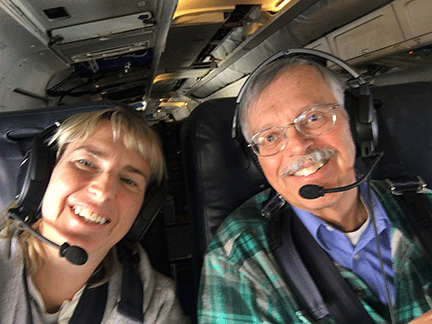NMT Begins Field Campaign To Study Tropical Hurricanes
August 5, 2019
SOCORRO, N.M. – New Mexico Tech professors are launching an innovative field campaign to study tropical convection and the genesis of hurricanes this month.
The Organization of Tropical East Pacific Convection, or OTREC, is an NSF-funded project based at New Mexico Tech that studies convection to gain better understanding of the physics and improve our global weather and climate models.
 Dr. Zeljka Fuchs-Stone and Dr. Dave Raymond (pictured at right on a previous field
campaign) will lead the two-month-long field study. The team includes scientists from
several other universities and government agencies in the United States, Costa Rica,
and Colombia.
Dr. Zeljka Fuchs-Stone and Dr. Dave Raymond (pictured at right on a previous field
campaign) will lead the two-month-long field study. The team includes scientists from
several other universities and government agencies in the United States, Costa Rica,
and Colombia.
“We will fly in stormy weather and calm weather,” Fuchs-Stone said. “We want to take measurements when the storm is developing, but also right before as well as soon after.”
Fuchs-Stone said that convection, when air rises or falls due to temperature differences, is one of the driving forces behind storm formation and weather. Studying convection helps scientists understand the physics of storms better, and improves global weather and climate models.
“With these data profiles from different cases, we hope to be able to figure out what’s different between instances that lead to hurricanes and those that don’t.”
Eric DeWeaver, the NSF program manager for OTREC said, “Hurricanes are clearly a big concern for the U.S. and an important research area for NSF. But it’s not enough to understand hurricanes, we also want to understand how tropical convection forms, organizes, and develops to the point where it can spawn hurricanes. The OTREC campaign is a great way to get at these questions and I think we’re going to learn a lot from it.”
The field phase of the project OTREC starts August 5 and lasts till September 30. Dozens of scientists and students from the U.S. – including four NMT students -- will be stationed in Costa Rica to gather data by using the NCAR/NSF Gulfstream V aircraft to deploy over 600 drop sondes. These instruments measure temperature, humidity, pressure and wind, from the plane to the ocean. The team will also use NCAR's downward-pointing W-band radar. Additional radiosondes will be launched from the ground from locations in Costa Rica and Colombia.
In addition to NMT, the core group of investigators in OTREC consists of scientists from Harvard University, University of Wisconsin, National Oceanic and Atmospheric Administration, Colorado State University, University of Washington, and Columbia University.
– NMT –